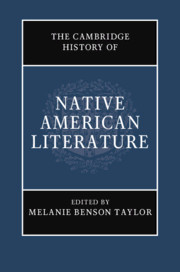Book contents
- The Cambridge History of Native American Literature
- The Cambridge History of Native American Literature
- Copyright page
- Contents
- Figures
- Contributors
- Introduction: What Was Native American Literature?
- Part I Traces and Removals (Pre-1870s)
- 1 Indigenous Languages and the Origins of American Literary History
- 2 Unsettling Colonial Temporalities: Oral Traditions and Indigenous Literature
- 3 Early Native American Literature and Hemispheric Studies
- 4 Performative Cultures of Early America
- 5 Nineteenth-Century American Indian Newspapers and the Construction of Sovereignty
- 6 Indigenous Literacies in Early New England
- Part II Assimilation and Modernity (1879–1967)
- Part III Native American Renaissance (Post-1960s)
- Part IV Visions and Revisions: 21st-Century Prospects
- Index
- References
2 - Unsettling Colonial Temporalities: Oral Traditions and Indigenous Literature
from Part I - Traces and Removals (Pre-1870s)
Published online by Cambridge University Press: 18 September 2020
- The Cambridge History of Native American Literature
- The Cambridge History of Native American Literature
- Copyright page
- Contents
- Figures
- Contributors
- Introduction: What Was Native American Literature?
- Part I Traces and Removals (Pre-1870s)
- 1 Indigenous Languages and the Origins of American Literary History
- 2 Unsettling Colonial Temporalities: Oral Traditions and Indigenous Literature
- 3 Early Native American Literature and Hemispheric Studies
- 4 Performative Cultures of Early America
- 5 Nineteenth-Century American Indian Newspapers and the Construction of Sovereignty
- 6 Indigenous Literacies in Early New England
- Part II Assimilation and Modernity (1879–1967)
- Part III Native American Renaissance (Post-1960s)
- Part IV Visions and Revisions: 21st-Century Prospects
- Index
- References
Summary
Native American oral traditions unsettle any notion of linear temporality, colonial and otherwise. This chapter therefore does not observe the requirements of “history” in the usual sense. Instead, it recommends appraising the evidence of orally transmitted Indigenous texts, collected and edited under conditions of colonial reeducation and cultural trauma, to force us to think critically about the implicit assumptions inherent in our use of the term “history.” The chapter shows that oral narratives have the capacity to condense various temporal events into complex, symbolically overdetermined stories that are both literary and historical; it discusses the performative aspects of oral traditions, without which written texts are only partially intelligible; it argues that oral texts are crucially observant of place and land; and it proposes to give more weight to oral traditions in studies of Native American literature, as well as in educational settings today.
Keywords
- Type
- Chapter
- Information
- The Cambridge History of Native American Literature , pp. 33 - 50Publisher: Cambridge University PressPrint publication year: 2020



